Yinwei Dai
Legilimens: Performant Video Analytics on the System-on-Chip Edge
Apr 29, 2025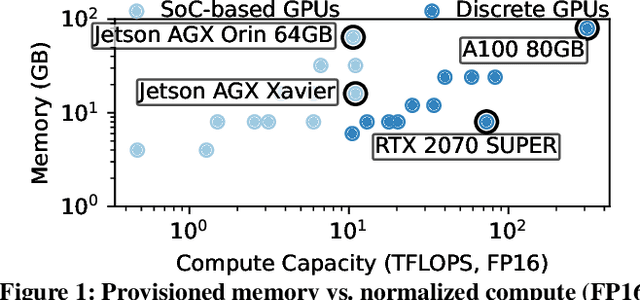

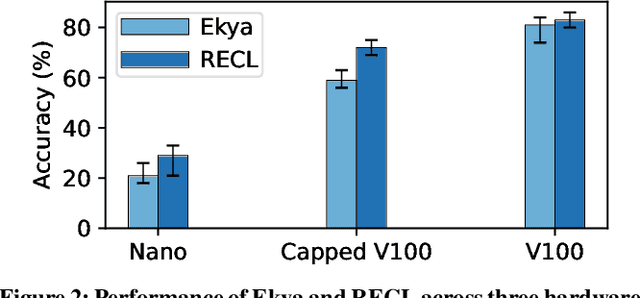
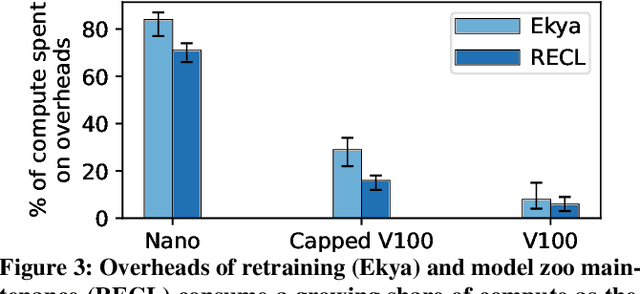
Abstract:Continually retraining models has emerged as a primary technique to enable high-accuracy video analytics on edge devices. Yet, existing systems employ such adaptation by relying on the spare compute resources that traditional (memory-constrained) edge servers afford. In contrast, mobile edge devices such as drones and dashcams offer a fundamentally different resource profile: weak(er) compute with abundant unified memory pools. We present Legilimens, a continuous learning system for the mobile edge's System-on-Chip GPUs. Our driving insight is that visually distinct scenes that require retraining exhibit substantial overlap in model embeddings; if captured into a base model on device memory, specializing to each new scene can become lightweight, requiring very few samples. To practically realize this approach, Legilimens presents new, compute-efficient techniques to (1) select high-utility data samples for retraining specialized models, (2) update the base model without complete retraining, and (3) time-share compute resources between retraining and live inference for maximal accuracy. Across diverse workloads, Legilimens lowers retraining costs by 2.8-10x compared to existing systems, resulting in 18-45% higher accuracies.
SpecReason: Fast and Accurate Inference-Time Compute via Speculative Reasoning
Apr 10, 2025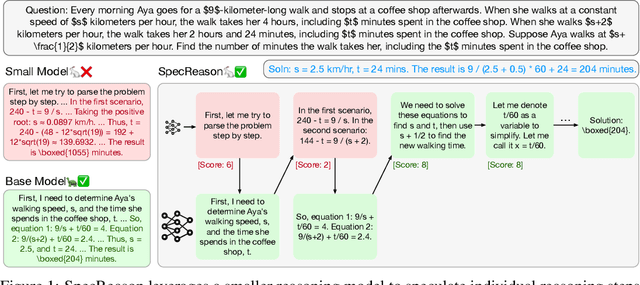



Abstract:Recent advances in inference-time compute have significantly improved performance on complex tasks by generating long chains of thought (CoTs) using Large Reasoning Models (LRMs). However, this improved accuracy comes at the cost of high inference latency due to the length of generated reasoning sequences and the autoregressive nature of decoding. Our key insight in tackling these overheads is that LRM inference, and the reasoning that it embeds, is highly tolerant of approximations: complex tasks are typically broken down into simpler steps, each of which brings utility based on the semantic insight it provides for downstream steps rather than the exact tokens it generates. Accordingly, we introduce SpecReason, a system that automatically accelerates LRM inference by using a lightweight model to (speculatively) carry out simpler intermediate reasoning steps and reserving the costly base model only to assess (and potentially correct) the speculated outputs. Importantly, SpecReason's focus on exploiting the semantic flexibility of thinking tokens in preserving final-answer accuracy is complementary to prior speculation techniques, most notably speculative decoding, which demands token-level equivalence at each step. Across a variety of reasoning benchmarks, SpecReason achieves 1.5-2.5$\times$ speedup over vanilla LRM inference while improving accuracy by 1.0-9.9\%. Compared to speculative decoding without SpecReason, their combination yields an additional 19.4-44.2\% latency reduction. We open-source SpecReason at https://github.com/ruipeterpan/specreason.
Apparate: Rethinking Early Exits to Tame Latency-Throughput Tensions in ML Serving
Dec 08, 2023Abstract:Machine learning (ML) inference platforms are tasked with balancing two competing goals: ensuring high throughput given many requests, and delivering low-latency responses to support interactive applications. Unfortunately, existing platform knobs (e.g., batch sizes) fail to ease this fundamental tension, and instead only enable users to harshly trade off one property for the other. This paper explores an alternate strategy to taming throughput-latency tradeoffs by changing the granularity at which inference is performed. We present Apparate, a system that automatically applies and manages early exits (EEs) in ML models, whereby certain inputs can exit with results at intermediate layers. To cope with the time-varying overhead and accuracy challenges that EEs bring, Apparate repurposes exits to provide continual feedback that powers several novel runtime monitoring and adaptation strategies. Apparate lowers median response latencies by 40.5-91.5% and 10.0-24.2% for diverse CV and NLP workloads, respectively, without affecting throughputs or violating tight accuracy constraints.
Auxo: Heterogeneity-Mitigating Federated Learning via Scalable Client Clustering
Oct 29, 2022Abstract:Federated learning (FL) is an emerging machine learning (ML) paradigm that enables heterogeneous edge devices to collaboratively train ML models without revealing their raw data to a logically centralized server. Heterogeneity across participants is a fundamental challenge in FL, both in terms of non-independent and identically distributed (Non-IID) data distributions and variations in device capabilities. Many existing works present point solutions to address issues like slow convergence, low final accuracy, and bias in FL, all stemming from the client heterogeneity. We observe that, in a large population, there exist groups of clients with statistically similar data distributions (cohorts). In this paper, we propose Auxo to gradually identify cohorts among large-scale, low-participation, and resource-constrained FL populations. Auxo then adaptively determines how to train cohort-specific models in order to achieve better model performance and ensure resource efficiency. By identifying cohorts with smaller heterogeneity and performing efficient cohort-based training, our extensive evaluations show that Auxo substantially boosts the state-of-the-art solutions in terms of final accuracy, convergence time, and model bias.
FedScale: Benchmarking Model and System Performance of Federated Learning
May 24, 2021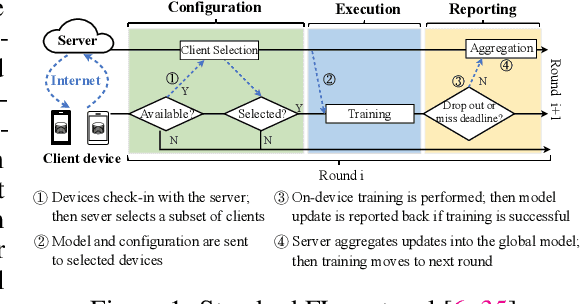

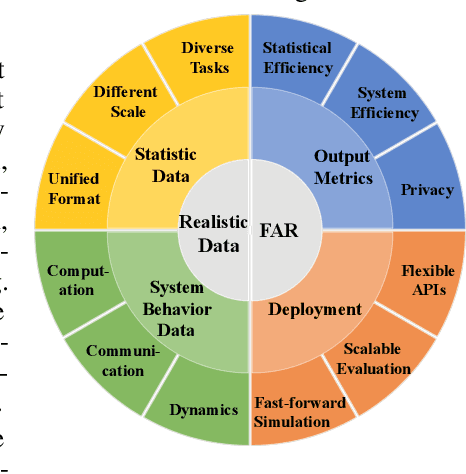
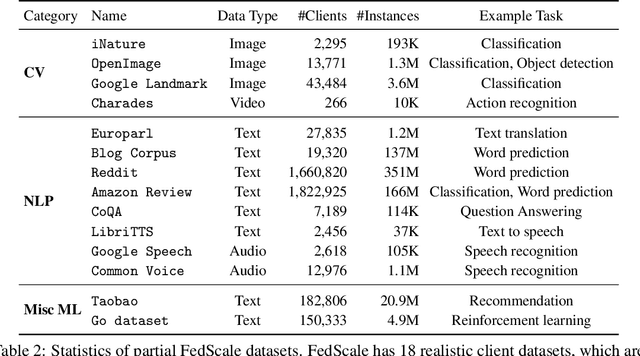
Abstract:We present FedScale, a diverse set of challenging and realistic benchmark datasets to facilitate scalable, comprehensive, and reproducible federated learning (FL) research. FedScale datasets are large-scale, encompassing a diverse range of important FL tasks, such as image classification, object detection, language modeling, speech recognition, and reinforcement learning. For each dataset, we provide a unified evaluation protocol using realistic data splits and evaluation metrics. To meet the pressing need for reproducing realistic FL at scale, we have also built an efficient evaluation platform to simplify and standardize the process of FL experimental setup and model evaluation. Our evaluation platform provides flexible APIs to implement new FL algorithms and include new execution backends with minimal developer efforts. Finally, we perform indepth benchmark experiments on these datasets. Our experiments suggest that FedScale presents significant challenges of heterogeneity-aware co-optimizations of the system and statistical efficiency under realistic FL characteristics, indicating fruitful opportunities for future research. FedScale is open-source with permissive licenses and actively maintained, and we welcome feedback and contributions from the community.
 Add to Chrome
Add to Chrome Add to Firefox
Add to Firefox Add to Edge
Add to Edge